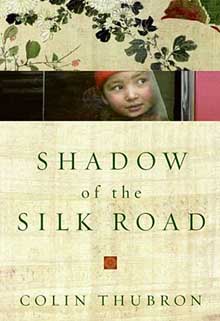The Critics: ‘Shadow of the Silk Road’
Travel Books: Michael Yessis checks out what reviewers are saying about the U.S. release of the new book by Colin Thubron, "the dean of British travel writers"
07.17.07 | 11:25 AM ET
 It’s Lorranine Adams who calls Colin Thubron the dean of British travel writers—in a review that appears on the cover of this week’s New York Times Book Review. It’s a reverent title offered in prime critical real estate, and it’s representative of the excellent reception Shadow of the Silk Road has received.
It’s Lorranine Adams who calls Colin Thubron the dean of British travel writers—in a review that appears on the cover of this week’s New York Times Book Review. It’s a reverent title offered in prime critical real estate, and it’s representative of the excellent reception Shadow of the Silk Road has received.
Adams writes that Thubron “would hate being called the dean of anything,” but his nine travel books and his seasoned viewpoint make it an apt description.
From her review:
With its elegiac tone, “Shadow of the Silk Road” is moving in a way that’s rare in travel literature, sidestepping nostalgia even as it notes its pull. Thubron goes to places most other sojourners can’t—because they’re not so much geographic locations as states of mind, formed from the lifelong accretion of intriguing facts, mistaken hopes, mysteries. Here, on civilization’s oldest and longest road, which isn’t quite a road, he has found his way into that kingdom and brought it into focus for us.
The book chronicles Thubron’s approximately 7,000-mile trip between Xian, China and Antioch, Turkey. Thubron traveled the Chinese portion of his trip, the Washington Post’s Jonathan Yardley notes, in 2002, at the peak of the SARS scare. But neither microbes nor his advancing age—Thubron is now 68—stopped him from making his journey along the ancient trading route from China to the Mediterranean Sea.
Yardley writes:
Obviously, he had an uncommonly interesting and rewarding time, and he has now written an uncommonly interesting and rewarding book about it. Though I can recall no mention of the vogue word “globalization” in the course of this narrative, Shadow of the Silk Road arrives just as the reality of a shrunken globe has become inescapable. It provides timely evidence of the pressures this phenomenon exerts and the instinct of human beings—especially those in remote places that only now are being touched by the modern world—to resist it, to hold on to their old ways. If on the one hand Thubron’s journey was undertaken to see the legendary Silk Road and discover how much of it has survived over the many centuries, on the other hand he ended up writing a book that is largely about change.
In the San Francisco Chronicle Peter Lewis, who groups “Shadow” into a review with Rosemary Mahoney’s “Down the Nile,” notes that “Thubron has done it all, with sparkling grace.” He adds that Thubron is a “brilliant brooder, artful in his melancholy.”
Richard Horan, writing in the Christian Science Monitor, calls “Shadow” classical studies meets exotic adventure. “And it is quite the journey - physically, emotionally, and intellectually,” Horan writes.
These U.S. reviews echo some of the reviews the book received upon its release last year in the U.K. In the Financial Times, Stephen Fidler called Thubron “one of the best of British travel writers still embarking on epic journeys.”
He added:
Apart from the quality of his writing, one reason for enjoying Thubron lies in the way he engages with people. He exudes neither the cheerfulness of an Eric Newby, nor the misanthropy of a Wilfred Thesiger, but he is above all humane, a cool but sympathetic observer.
The London Times liked “Shadow of the Silk Road” enough to offer three excerpts from the book last September, and last month it gave the book another honor: The paper picked it as the audio book of the week.![]()